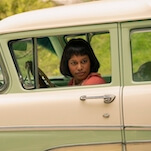Although too few movies take into
account the rich lives of the elderly—unless those elderly are actors
trying to pass as action heroes—that doesn't fully excuse a movie as
cloying and predictable as Elsa & Fred. Manuel Alexandre and China Zorrilla star as
unattached neighbors who take turns inadvertently insulting each other, then
develop a grudging friendship that turns into a tentative romance. She's a
brassy matron who speaks her mind, craves adventure, and models herself after
Anita Ekberg. He's a timid soul who clings to his routine and his medication,
and sums up his late wife in one word: "tidy." Will they overcome their
differences and find happiness together before either the end credits roll or
one of them croaks? Do you even need to ask?
Writer-director Marcos Carnevale
keeps Elsa & Fred breezy and light—even with the specter of death hovering over his
leads—but the absence of bite prevents the movie from leaving any kind of
impression. Well, that and the way Carnevale and his screenwriting partners
Lily Ann Martin and Marcela Guerty try to get laughs out of Alexandre's
flatulent dog, or from Zorrilla's fumbling attempt to appreciate abstract
painting. ("It's art because there's nothing to understand," she mutters,
making a joke that hasn't been funny in about 50 years.) A few moments in Elsa
& Fred ring
true: Carnevale takes the time to show Alexandre's breakfast menu of pills and
coffee, and to catch Zorrilla struggling to her feet in the morning to get into
her shower. And the movie's climactic recreation of Ekberg's fountain scene
from Federico Fellini's La Dolce Vita is sweetly moving, though Fellini's own Intervista has already riffed on that scene
with aging actors. But it's hard to overlook how much of Elsa & Fred is rote and pre-chewed. At one
point, Zorrilla actually says to Alexandre, "You're not afraid of dying, you're
afraid of living." Ye gods.









































